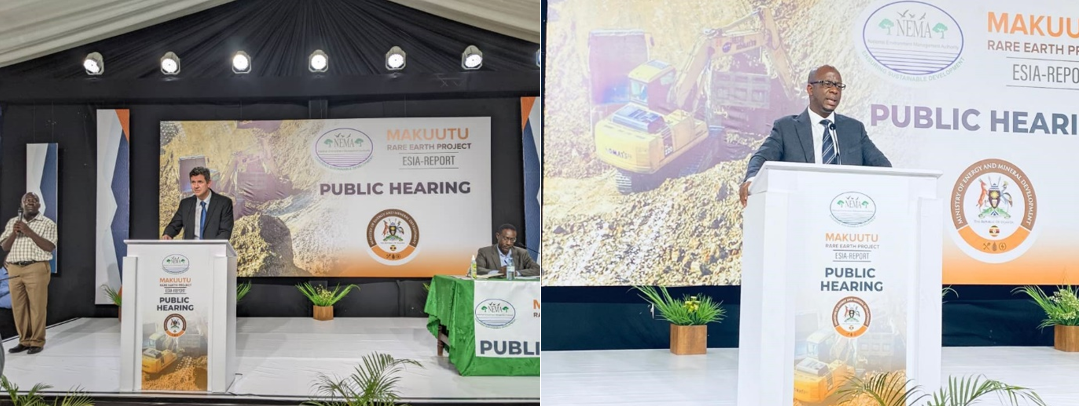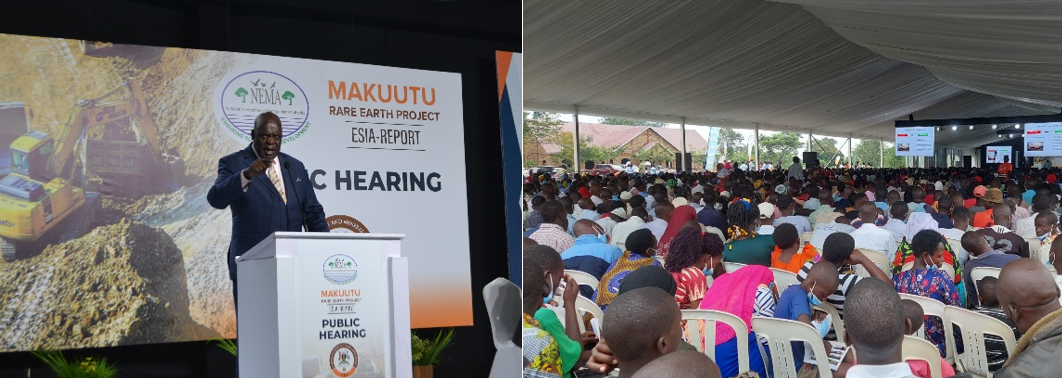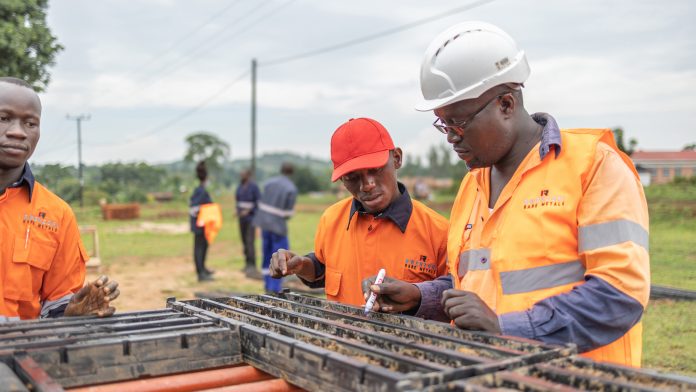Ionic Rare Earths is assisting the global transition to clean energy through rare earth production and magnet recycling.
Australian listed company, Ionic Rare Earths Limited (ASX:IXR), is setting itself apart from the growing list of rare earth miners by looking to solve the complex global problems of demand outstripping sustainable supply chains, geopolitics, and recycling. The strategy is to help transition and power a low-carbon future globally, for life. The company is completing the circular economy of mining: refining and recycling heavy rare earths.
The Makuutu project is set to become a globally significant producer of both heavy rare earth oxides (HREO) and critical rare earth oxides (CREO), providing a viable, large-scale, low-cost alternative supply chain outside of China.
The next phase of commercialisation alongside Makuutu is the recycling business. The recently announced rebranding of the 100% UK-based subsidiary Ionic Technologies (IonicTech) will focus on scaling up heavy magnet recycling to increase the modular supply of heavy magnets used in electric vehicles (EVs) and wind turbines.
The Makuutu Rare Earth project
IonicRE is developing the large-scale Makuutu ionic adsorption clay (IAC) deposit in Uganda, which the company says has one of the highest value ‘baskets’ of all rare earth element (REE) projects in evaluation today.
The Makuutu project will be Uganda’s flagship sustainable mine. The project is poised to be a low-cost, significant long life, high-margin, supplier of high-value magnets and heavy rare earth oxides.
Makuutu is an advanced-stage, IAC-hosted REE project highlighted by near-surface mineralisation and significant exploration upside. The clay-hosted geology at Makuutu is similar to major IAC rare earth projects in southern China, which are responsible for the majority of the global supply of low-cost rare earths. The deposit is shallow, with less than three metres of cover over a nine-metre average thickness clay and saprolite zone, which results in low-cost bulk mining methods with a low strip ratio. A maximum thickness of 28.5m has been identified at Makuutu.
The project is well-supported by tier-one existing infrastructure which includes access to major highways, roads, power, water, and a professional workforce, and is located 120km east of Kampala in Uganda.
Processing is via simple acidified salt desorption heap leaching, breaking the chemical ionic bond which washes the rare earths (in a chemical form) from the ore into a pregnant leach solution (PLS). The PLS is concentrated up using membrane technology, from which the rare earths are precipitated as a mixed rare earth carbonate product; a product which attracts both a higher payability and achieves a high basket price due to the dominant high-value magnets and heavy rare earths which make up over 70% of the product basket.
The Makuutu project is set to become Uganda’s flagship sustainable mine and is poised to support the country achieve goals set in the Third National Development Plan (NDPIII) through mining. The company plans to use renewable energy, alternative sources of fuel, and apply sustainable mining practices to reduce their impact on the environment – positively contributing to Uganda’s Gross Domestic Product (GDP) for many decades into the future.
Social license to operate
Already the Makuutu Rare Earth project has begun to transform local lives. A number of health, education, water purification, and community support programmes have taken place to date. These sustainable development programmes continue to positively impact and support the communities which fall within the three districts (Bugweri, Mayuge, and Bugiri) of the Makuutu project. During the COVID-19 pandemic, these community programmes supported community safety and improved employment opportunities.
These inclusive growth programmes will continue to expand as the mine develops. Strong partnerships are being built to ensure that the social impact felt within the communities continues to drive change well into the future.
The company has integrated social, environment, and governance (ESG) principles into its operations, and has committed to sustainability, accountability, and transparency, the driving force behind the culture of the IonicRE social programmes.
Some of the benefits the local community members have benefacted from to date include:
- Renovation of the Natural Resource Office Block at Bugweri District;
- Renovation of the Buwaaya police station;
- Due to poor drinking water quality, serviced 11 community boreholes across the project area;
- Donated 86 tree seedlings to the Mayuge District in commemoration of the water and environment week; and
- Donated balls to the Makuutu football team in support of youth sports.
The company’s Environmental and Social Impact Assessment (ESIA) was submitted to the National Environmental Management Authority (NEMA) in December 2021.
Two public hearings were completed in early August 2022 in the Bugweri and Mayuge Districts with significant turnout from NEMA, the Ministry of Energy and Mineral Development (MEMD), government representatives, district leadership, local communities, and stakeholders who provided strong support for the project. The total registered attendees at the hearings over the two days amounted to 3,800 people, indicating a keen interest in the project by the Ugandan community.
NEMA and MEMD are now working to complete final statutory requirements to evaluate the ESIA and provide a formal decision.


Creating shared value
IonicRE will create shared value as a miner – refiner – recycler, securing magnet and heavy REOs for renewable energy applications and to reduce sovereign risk, and completing the circular economy of rare earths.
The newly rebranded heavy magnet recycling subsidiary, IonicTech, based in Belfast UK (formerly Seren Technologies Limited), has developed unique separation and refining technology. This has been applied to magnet rare earth extraction and refining recovery from permanent magnet recycling.
IonicTech offers first mover capability for downstream magnet recycling – separating 99.9%+ magnet REOs to feed EV, offshore wind, and defence applications.
Recycling of magnet REOs presently makes up 40% of the current supply chain, of which greater than 99% is conducted in China. IonicTech will recycle and refine magnet REOs, supplying a secure and traceable solution to providing the inputs needed to accelerate the world towards carbon neutrality.
The new brand consolidates upon IonicRE’s strategy to become a fully integrated circular economy participant for critical magnet and heavy rare earths. Increasing supply of these critical elements by providing localised modular recycling developments represents a strong opportunity for IonicRE to develop an early mover advantage on the back of their advanced technology. This technology can hydrometallurgical extract the elemental REE content from the waste material, and then separate and refine to produce the individually separated 99.9% grade REOs – Nd2O3, Pr6O11, Dy2O3, and Tb4O7.
IonicTech is now accelerating the scale up of the technology, completing a new pilot plant at its new facility at the Titanic Quarter in Belfast UK. The company was recently awarded a grant of £1.72m (approximately A$2.9m) from the UK Government’s Innovate UK Automotive Transformation Fund Scale up Readiness Validation (SuRV) programme, to develop a demonstration scale magnet recycling plant, a significant step towards securing the UK supply of critical rare earth metals for EV manufacturing.
IonicRE sees the commercialisation of the technology offering from IonicTech into modular magnet recycling initiatives and partnerships, with global governments looking to develop domestic magnet REO supply chains to empower localised manufacturing, including EV and renewable energy transitions. Such partnerships will also provide more secure and traceable supply chains for critical raw materials.
Ionic Technologies, Mr Tim Harrison, Managing Director of IonicRE, commented: “We are delighted to be able to now formally progress with the change of name to Ionic Technologies, and to commence building the brand from which we will commercialise a leading edge, patented technology to help deliver a viable alternative solution for the processing of waste agent and swarf to produce separated and refined REOs to be used in new permanent magnets.
“The latest statistics from Wood MacKenzie and Adamas Intelligence suggest the magnet REO supply is sourced between 30-40% from recycled materials, with China dominating over 99% of the magnet recycling landscape. IonicRE, through Ionic Technologies, aims to provide an alternative option, with a low cost, modular entry for recycled magnet REOs deployable close to sources of secondary material.
“A further benefit from the recycling of spent magnets and swarf is that is does not have any radionuclide issues to manage, a problem that creates significant issues for primary hard rock REE resources. The positive sustainability impacts and material value recycling adds to IonicRE’s stakeholders, and, importantly to the environment is an example of the global solutions that are being addressed through our corporate strategy.
“The circular economy of rare earths will become increasingly more important over years to come, with the current production of magnet rare earths in significant deficit to forecast demand, and with no new supply coming to production, and no new projects in construction today, the deficit is expected to further increase.”
Rare earths for life
The adopted strapline refers to the circular economy of the products expected to be produced by IonicRE; firstly, from its flagship Makuutu Rare Earth Project in Uganda, which has the potential to produce agent and heavy rare earths for decades to come, and secondly from its unique recycling technology, providing a true circular economy of magnet rare earth production.







